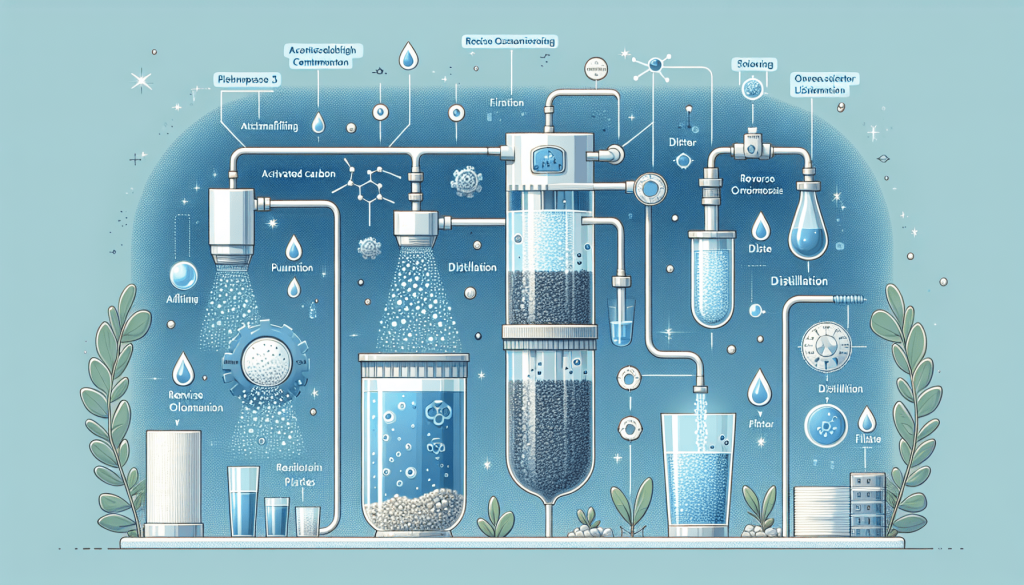Imagine never having to worry about the quality of the water you consume, knowing that every time you take a sip, you’re only getting the purest and cleanest water. In our quest for healthier lives, we often wonder if there is a water filter out there that can remove absolutely everything from our water. Look no further, for this article will reveal the truth behind the most advanced water filters on the market, and whether they truly have the power to eliminate every single contaminant imaginable.
Types of Water Filters
When it comes to choosing a water filter, there are several options available to ensure clean and safe drinking water. The three main types of water filters are carbon filters, reverse osmosis filters, and UV filters. Each type has its own mechanism of action and effectiveness in removing different contaminants from water. Understanding these options can help you make an informed decision about which water filter is best suited for your needs.
Carbon Filters
Carbon filters, also known as activated carbon filters, are one of the most common types of water filters available. These filters are highly effective in removing many common contaminants found in water, including sediments, chlorine, heavy metals, pesticides, and some viruses and bacteria.
The mechanism of action of carbon filters involves the use of activated carbon, which is a form of carbon that has been specially treated to have a large surface area and porous structure. This allows the carbon to trap and adsorb contaminants as the water passes through the filter. The activated carbon has a strong affinity for organic compounds and can effectively remove unpleasant tastes and odors from water, resulting in improved taste and odor.
While carbon filters are effective in removing a wide range of contaminants, they do have limitations. They may not be as effective in removing certain contaminants such as dissolved minerals or salts. Additionally, the lifespan of carbon filters can vary depending on the quality of the water and the amount of contaminants present. It is important to regularly replace the carbon filter according to the manufacturer’s recommendations to maintain its effectiveness.

Reverse Osmosis Filters
Reverse osmosis filters are another popular choice for water filtration. These filters use a membrane to separate contaminants from water. The mechanism of action of reverse osmosis filters involves applying pressure to the water, forcing it through a semipermeable membrane that allows water molecules to pass through while blocking large molecules and contaminants.
Reverse osmosis filters are highly effective in removing various contaminants, including sediments, chlorine, heavy metals, pesticides, and dissolved solids such as salts and minerals. They are particularly effective in removing contaminants that have a larger molecular size, ensuring cleaner and safer drinking water.
While reverse osmosis filters provide excellent filtration, they do have some disadvantages to consider. The filtration process can be slow, resulting in a lower water flow rate compared to other types of filters. Additionally, reverse osmosis filters waste a significant amount of water during the filtration process, which can increase water usage and utility costs. Regular maintenance is also required to ensure the optimal performance of the filter.
UV Filters
UV filters, also known as ultraviolet filters, use ultraviolet light to disinfect water and eliminate bacteria, viruses, and other microorganisms. The mechanism of action of UV filters involves exposing the water to UV light, which damages the DNA of microorganisms and prevents them from reproducing.
UV filters are highly effective in neutralizing harmful microorganisms and ensuring safe drinking water. They are particularly useful in areas where water sources may be contaminated with bacteria or viruses. UV filters do not require chemicals or complex treatment processes, making them a convenient and environmentally friendly option.
However, UV filters have limitations when it comes to removing other types of contaminants. They are not effective in removing sediments, chemicals, heavy metals, or dissolved solids from water. Therefore, it is important to consider the specific needs and contaminants present in your water source when choosing a water filter.

Combination Filters
In some cases, combining different types of filters can provide enhanced water filtration. Combination filters typically involve the use of multiple stages or cartridges, each designed to address specific contaminants. These filters may include a combination of carbon, reverse osmosis, and UV filtration to ensure comprehensive water treatment.
The advantages of combination filters include a higher level of contaminant removal and improved overall water quality. By using different filtration methods, combination filters can effectively remove a wide range of contaminants, including sediments, chlorine, heavy metals, pesticides, bacteria, viruses, and dissolved solids. This makes them a popular choice for areas with high levels of contamination or specific water quality concerns.
However, combination filters may also have some disadvantages. They can be more complex to install and maintain than single-stage filters. Additionally, the cost of combination filters may be higher due to the multiple filtration stages and cartridges required. It is important to consider the specific contaminants in your water source and your budget when deciding whether a combination filter is the right choice for you.
Benefits of Using Water Filters
Using a water filter to purify your drinking water offers several benefits for you and your household.
Firstly, water filters can greatly improve the taste and odor of your water. By removing contaminants such as chlorine and sediments, water filters can provide a fresher and cleaner taste. This can make a significant difference, especially for individuals who are sensitive to the strong taste or smell of chlorine.
Secondly, water filters effectively remove harmful substances from your drinking water. Common contaminants such as heavy metals, pesticides, and bacteria can pose serious health risks if consumed. By using a water filter, you can eliminate these contaminants and reduce the potential health hazards associated with them.
Lastly, using a water filter can provide various health benefits. Drinking clean and filtered water can contribute to improved hydration, digestion, and overall well-being. Additionally, filtered water is free from harmful substances that could potentially weaken the immune system or cause long-term health problems.

Limitations of Water Filters
While water filters offer numerous benefits, it is important to understand their limitations before making a decision.
Firstly, water filters may have limited effectiveness against certain contaminants. Some dissolved minerals or salts, such as fluoride or nitrates, may not be effectively removed by certain types of filters. It is important to research the specific contaminants in your water source and choose a filter that is specialized in removing those contaminants.
Maintenance and replacement are also important factors to consider. Water filters require regular maintenance to ensure optimal performance. This may include cleaning or replacing filter cartridges, checking water pressure, and monitoring the overall condition of the filter. Additionally, filters have a lifespan and will eventually need to be replaced. It is essential to follow the manufacturer’s recommendations and replace the filter as instructed to maintain its effectiveness.
Cost is another factor to consider when choosing a water filter. Different types of filters have varying upfront costs, ongoing maintenance costs, and filter replacement costs. It is important to consider your budget and the long-term costs associated with the filter you choose. Additionally, it may be beneficial to compare the cost of filtered water to the cost of purchasing bottled water or other alternatives.
Conclusion
Choosing the right water filter is essential to ensure clean and safe drinking water for you and your family. Consider factors such as your water source, contaminant level, filter lifespan, and cost when making a decision. Carbon filters, reverse osmosis filters, and UV filters all have their own mechanisms of action and effectiveness in removing contaminants, so choose a filter that suits your specific needs. Remember the benefits of using water filters, such as improved taste, removal of harmful substances, and health benefits. However, be aware of the limitations of water filters, including limited effectiveness against some contaminants, maintenance and replacement requirements, and associated costs. By carefully considering these factors, you can confidently choose a water filter that will ensure clean and safe drinking water for you and your loved ones.



